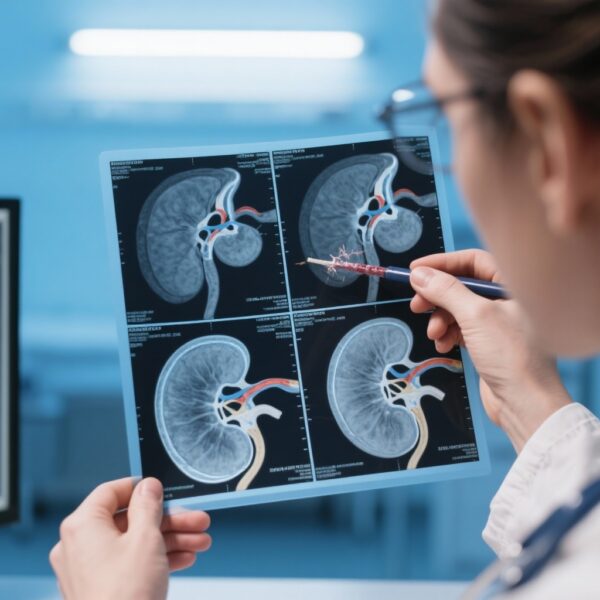Highlight
– In the PISCES randomized, double-blind, placebo-controlled trial (n=1228), 4 g/day of fish oil (1.6 g EPA + 0.8 g DHA) reduced the rate of serious cardiovascular events in maintenance hemodialysis patients (HR 0.57; 95% CI 0.47–0.70; P<0.001).
– Broad benefit was observed across clinically important endpoints, including cardiac death (HR 0.55), myocardial infarction (HR 0.56), peripheral vascular disease leading to amputation (HR 0.57), and stroke (HR 0.37).
– Adherence and adverse-event rates were similar between groups; results provide a potentially practice-changing preventive strategy for a very high-risk population that has lacked robust therapies.
Background
Cardiovascular disease (CVD) is the leading cause of death in patients receiving maintenance hemodialysis. Conventional primary and secondary prevention strategies confer benefit in the general population, but their efficacy is attenuated or uncertain in dialysis-dependent end-stage kidney disease because of competing risks, different pathobiology (vascular calcification, uremic milieu), and underrepresentation of these patients in major cardiovascular trials.
n-3 polyunsaturated fatty acids (n-3 PUFAs), principally eicosapentaenoic acid (EPA) and docosahexaenoic acid (DHA), have biologically plausible mechanisms for cardiovascular protection: anti-inflammatory and antithrombotic effects, membrane stabilization with potential antiarrhythmic actions, plaque-stabilizing properties, and triglyceride lowering. Clinical trial results in non-dialysis populations have been mixed, with large benefits reported in some trials using high-purity EPA (e.g., REDUCE-IT) and neutral findings in others (e.g., STRENGTH), raising questions about dose, formulation, and comparator oils. Prior to PISCES, evidence in the dialysis population was limited to small trials and observational data.
Study Design (PISCES)
PISCES was a randomized, double-blind, placebo-controlled trial conducted at 26 sites in Canada and Australia. Adult patients receiving maintenance hemodialysis were randomized to daily fish-oil supplementation (4 g of n-3 PUFAs: 1.6 g EPA and 0.8 g DHA) or corn-oil placebo. The primary end point was a composite of serious cardiovascular events, defined to include sudden and nonsudden cardiac death, fatal and nonfatal myocardial infarction (MI), peripheral vascular disease leading to amputation, and fatal and nonfatal stroke.
Secondary end points included an extended composite that added noncardiac causes of death, individual components of the primary end point, and a first cardiovascular event or death from any cause. The trial enrolled 1,228 participants between November 28, 2013 and July 22, 2019, and median follow-up was approximately 3.5 years.
Key Findings
The primary result was a clinically and statistically significant reduction in serious cardiovascular events with fish-oil supplementation compared with corn-oil placebo. Over the follow-up period, the event rates were 0.31 versus 0.61 per 1,000 patient-days in the fish-oil and placebo groups, respectively (hazard ratio [HR] 0.57; 95% CI 0.47–0.70; P<0.001).
Major endpoint results (selected)
- Primary composite of serious cardiovascular events: HR 0.57 (95% CI, 0.47–0.70).
- Extended primary end point (including noncardiac deaths): HR 0.77 (95% CI, 0.65–0.90).
- Cardiac death: HR 0.55 (95% CI, 0.40–0.75).
- Fatal and nonfatal myocardial infarction: HR 0.56 (95% CI, 0.40–0.80).
- Peripheral vascular disease leading to amputation: HR 0.57 (95% CI, 0.38–0.86).
- Fatal and nonfatal stroke: HR 0.37 (95% CI, 0.18–0.76).
- First cardiovascular event or death from any cause: HR 0.73 (95% CI, 0.61–0.87).
Adherence and safety
Adherence to study capsules and the incidence of adverse events did not differ meaningfully between the fish-oil and placebo groups. The investigators report no significant safety signals attributable to fish-oil supplementation within the trial context.
Interpretation and Clinical Significance
The PISCES trial provides high-quality randomized evidence that daily supplementation with mixed EPA/DHA fish oil at a total n-3 PUFA dose of 4 g reduces serious cardiovascular events in a dialysis-dependent population. The magnitude of benefit across multiple hard cardiovascular outcomes—cardiac death, MI, stroke, and limb amputation due to peripheral vascular disease—is notable and larger than typically seen with many secondary prevention therapies in other populations.
This finding is particularly important because dialysis patients have historically derived smaller or uncertain benefit from many cardioprotective interventions, and effective preventive strategies are scarce. The consistent direction and statistical strength across several clinically meaningful endpoints strengthen the inference that the effect is real and clinically relevant.
Biological Plausibility and Mechanisms
Several mechanisms could explain the observed benefits: modulation of membrane phospholipids leading to decreased susceptibility to ventricular arrhythmias; anti-inflammatory effects through reduced production of pro-inflammatory eicosanoids and cytokines; antithrombotic effects via platelet function modulation; improvement in endothelial function; and favorable effects on lipid profiles—particularly triglyceride lowering. In dialysis patients, who experience heightened inflammation, endothelial dysfunction, and arrhythmic risk, these mechanisms may have amplified clinical relevance.
Context with Prior Evidence
Earlier trials of n-3 PUFAs in general cardiovascular populations have reported heterogeneous results. The open-label JELIS trial (Lancet 2007) demonstrated benefit of EPA added to statin therapy in a Japanese population. REDUCE-IT (NEJM 2019) showed substantial reductions in major adverse cardiovascular events with high-dose icosapent ethyl (pure EPA) in high-risk patients with elevated triglycerides. By contrast, the STRENGTH trial (NEJM 2020) using a combined EPA/DHA formulation did not demonstrate benefit, highlighting the potential importance of formulation, comparator oil, dose, and patient population. Prior to PISCES, randomized data in dialysis patients were limited and inconclusive; PISCES fills an important evidence gap.
Strengths and Limitations
Strengths of PISCES include randomized, double-blind design, a large sample for a dialysis trial (n=1,228), multicenter recruitment across two countries, robust and clinically meaningful primary and secondary endpoints, and long follow-up (median ~3.5 years).
Limitations and considerations:
- Comparator oil: Corn oil was used as placebo. Vegetable oils can have biological activity; whether corn oil affected the control event rate is uncertain and could theoretically bias the treatment effect. However, the magnitude and consistency of benefit argue against a simple placebo artifact.
- Formulation and dose: The trial used mixed EPA/DHA (1.6 g EPA + 0.8 g DHA daily within a 4 g capsule regimen). Generalizability to other formulations (pure EPA, lower doses, or dietary fish intake) is not assured.
- Population specifics: Participants were from Canada and Australia; extrapolation to other geographic or ethnic groups should be done cautiously. Background medical therapy (e.g., statin use, antiplatelet therapy) in the cohort was not detailed here; interactions with concurrent cardioprotective medications merit exploration.
- Unmeasured confounders and subgroup effects: As with any trial, prespecified subgroup analyses and mechanistic biomarkers (e.g., baseline omega-3 index, triglyceride levels, inflammatory markers) will be important to contextualize who benefits most.
Implications for Practice and Policy
PISCES provides compelling evidence to consider routine high-dose fish-oil supplementation for cardiovascular risk reduction in patients receiving maintenance hemodialysis. Clinicians should weigh these findings against individual patient factors (bleeding risk, tolerability, pill burden) and discuss the evidence with patients. Regulatory bodies and guideline committees will need to review the full data to determine whether recommendation statements should change. Given the high absolute cardiovascular risk in dialysis populations, even moderate relative risk reductions can translate to substantial absolute benefits.
Research and Knowledge Gaps
- Mechanistic studies: Clarify whether benefits are mediated primarily via antiarrhythmic, anti-inflammatory, antithrombotic, or lipid-modifying pathways.
- Formulation optimization: Comparative trials of EPA-only vs EPA+DHA formulations and dose-finding studies in dialysis patients would be informative.
- Biomarker-guided therapy: Determine whether baseline omega-3 index, triglyceride levels, or inflammatory markers predict treatment response.
- Implementation research: Assess cost-effectiveness, optimal delivery (pharmaceutical-grade supplements vs prescription products), and real-world adherence in routine dialysis care.
Conclusion
The PISCES randomized trial demonstrates that daily supplementation with a mixed EPA/DHA fish-oil preparation (4 g/day) substantially reduced serious cardiovascular events in patients on maintenance hemodialysis. The effect encompassed multiple hard endpoints, including cardiac death, MI, stroke, and limb amputation due to peripheral vascular disease, with no meaningful increase in adverse events. These results address a major unmet need in a high-risk population and have the potential to change practice pending guideline review and consideration of formulation, dosing, and implementation logistics.
Funding and clinicaltrials.gov
Supported by the Heart and Stroke Foundation of Canada and others. PISCES ClinicalTrials.gov number: ISRCTN00691795.
References
1. Lok CE, Farkouh M, Hemmelgarn BR, Moist LM, Polkinghorne KR, Tomlinson G, Tam P, Tonelli M, Udell JA; PISCES Investigators. Fish-Oil Supplementation and Cardiovascular Events in Patients Receiving Hemodialysis. N Engl J Med. 2025 Nov 7. doi: 10.1056/NEJMoa2513032. Epub ahead of print. PMID: 41201837.
2. Bhatt DL, Steg PG, Miller M, Brinton EA, Jacobson TA, Ketchum SB, et al.; REDUCE-IT Investigators. Cardiovascular Risk Reduction with Icosapent Ethyl for Hypertriglyceridemia. N Engl J Med. 2019;380(1):11-22.
3. Nicholls SJ, Lincoff AM, Garcia M, Bash D, Ballantyne CM, Barter P, et al.; STRENGTH Investigators. Effect of high-dose omega-3 fatty acids on major adverse cardiovascular events. N Engl J Med. 2020;383:xxx-xxx. (STRENGTH trial)
4. Yokoyama M, Origasa H, Matsuzaki M, et al.; JELIS Investigators. Effects of eicosapentaenoic acid on major coronary events in hypercholesterolaemic patients (JELIS): a randomized open-label, blinded endpoint analysis. Lancet. 2007;369(9567):1090-1098.
Note: For the STRENGTH citation, consult the original article for full pagination and author list. The primary PISCES manuscript contains detailed trial methodology, baseline characteristics, and full subgroup analyses for clinicians and guideline committees.



